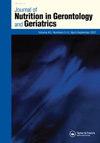“我尽量不吃糖。”老年2型糖尿病患者居家生活经历:自我管理障碍
Q3 Medicine
Journal of Nutrition in Gerontology and Geriatrics
Pub Date : 2019-11-23
DOI:10.1080/21551197.2019.1695037
引用次数: 5
摘要
摘要目的:研究定期接受家庭送餐和服务的居家老年人2型糖尿病(T2D)自我管理的经验和挑战。方法:采用电话抽样和目的抽样的方法,选取31名调查对象。随后在参与者家中进行了半结构化访谈。本研究中使用的解释方法是为了系统地评估T2D自我管理。结果:专题分析表明,参与者认为对自己的健康状况负有主要责任,但将任何不遵守规定归咎于缺乏社会和经济援助。在这项研究中,大多数老年人觉得自己有能力,但由于一些经济、身体和社会障碍,他们往往没有机会采取保护措施。结论:这些结果有助于更好地理解如何处理、支持和激励患T2D的居家老年人,同时应对挑战。研究结果为糖尿病自我管理教育(DSME)和干预措施的发展提供了见解。本文章由计算机程序翻译,如有差异,请以英文原文为准。
“I Try to Keep That Sugar Down.” Experiences of Homebound Older Adults With Type 2 Diabetes: Barriers to Self-Management
Abstract Objectives: To study the experiences and challenges of type 2 diabetes (T2D) self-management among homebound older adults who regularly receive home-delivered meals and services. Methods: Participants (n = 31) were recruited by telephone screening and were selected by purposive sampling. Semi-structured interviews were subsequently conducted within participants’ homes. The interpretive methodology utilized in this study was developed to systematically assess T2D self-management. Results: Thematic analysis shows that participants felt mostly responsible for their health status, but attributed any noncompliance to lack of social and economic assistance. Most of the seniors in this study felt competent, but often did not have the opportunity to engage in protective measures due to a number of economic, physical, and social barriers. Conclusions: These results contribute to a better understanding of how to approach, support, and motivate homebound older adults with T2D while addressing challenges. Findings offer insight into the development of diabetes self-management education (DSME) and interventions for this population.
求助全文
通过发布文献求助,成功后即可免费获取论文全文。
去求助
来源期刊

Journal of Nutrition in Gerontology and Geriatrics
Nursing-Nutrition and Dietetics
CiteScore
2.20
自引率
0.00%
发文量
13
期刊介绍:
The Journal of Nutrition in Gerontology and Geriatrics publishes original research studies that are directly relevant to clinical and community nutrition issues that affect older adults. Epidemiologic and community-based studies are suitable for JNE, as are well-controlled clinical trials of preventive and therapeutic nutritional interventions. The Journal of Nutrition in Gerontology and Geriatrics invites papers on a broad array of topics in the nutrition and aging field, including but not limited to studies of: preventive nutrition, nutritional interventions for chronic disease, aging effects on nutritional requirements, nutritional status and dietary intake behaviors, nutritional frailty and functional status, usefulness of supplements, programmatic interventions, transitions in care and long term care, and community nutrition issues.
 求助内容:
求助内容: 应助结果提醒方式:
应助结果提醒方式:


